[2021年暑假课程][八年级英语学科 第2讲 不定代词和情态动词](含答案)
文档属性
| 名称 | [2021年暑假课程][八年级英语学科 第2讲 不定代词和情态动词](含答案) | 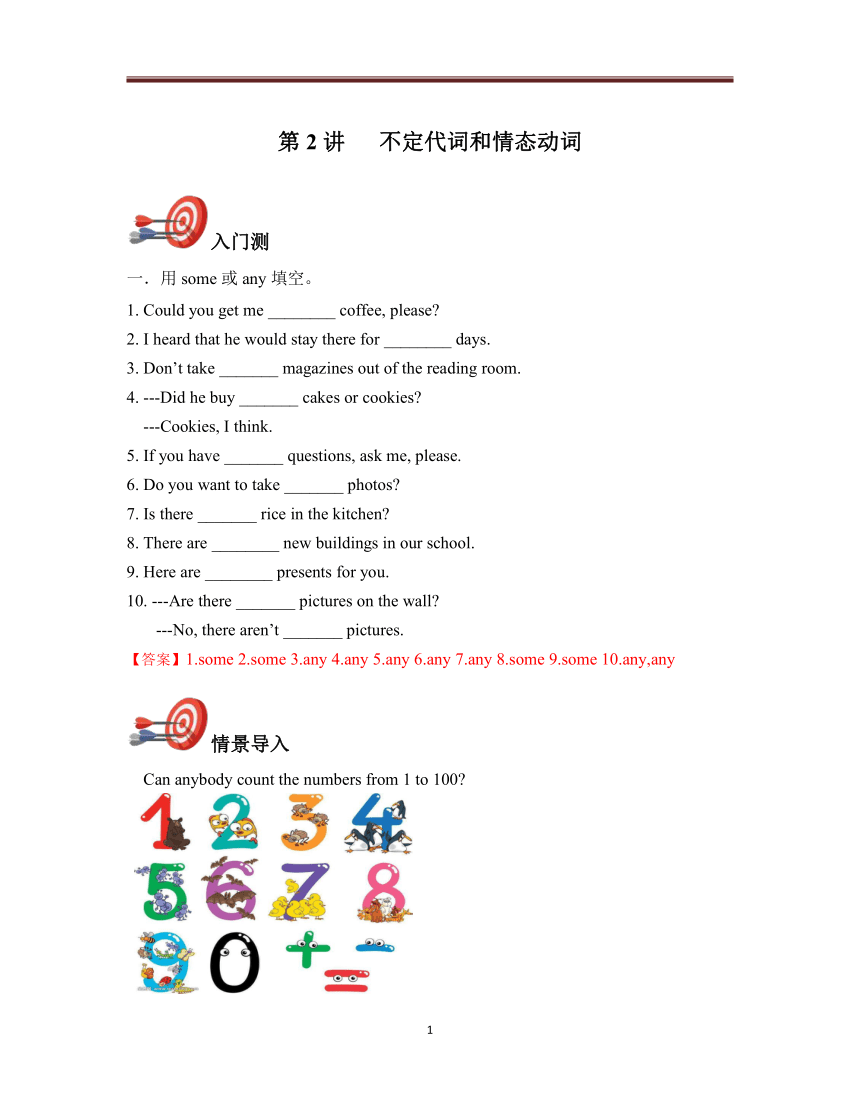 | |
| 格式 | zip | ||
| 文件大小 | 238.6KB | ||
| 资源类型 | 教案 | ||
| 版本资源 | 牛津深圳版 | ||
| 科目 | 英语 | ||
| 更新时间 | 2021-05-21 10:55:33 | ||
图片预览

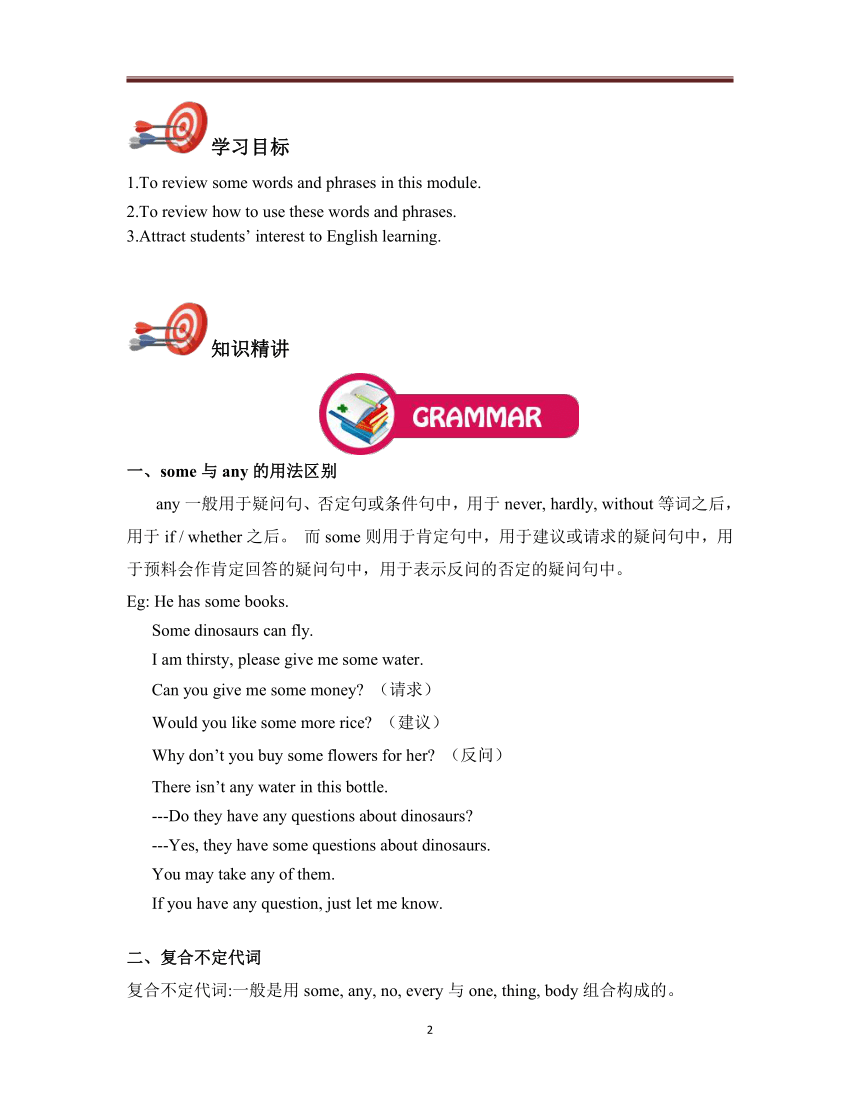
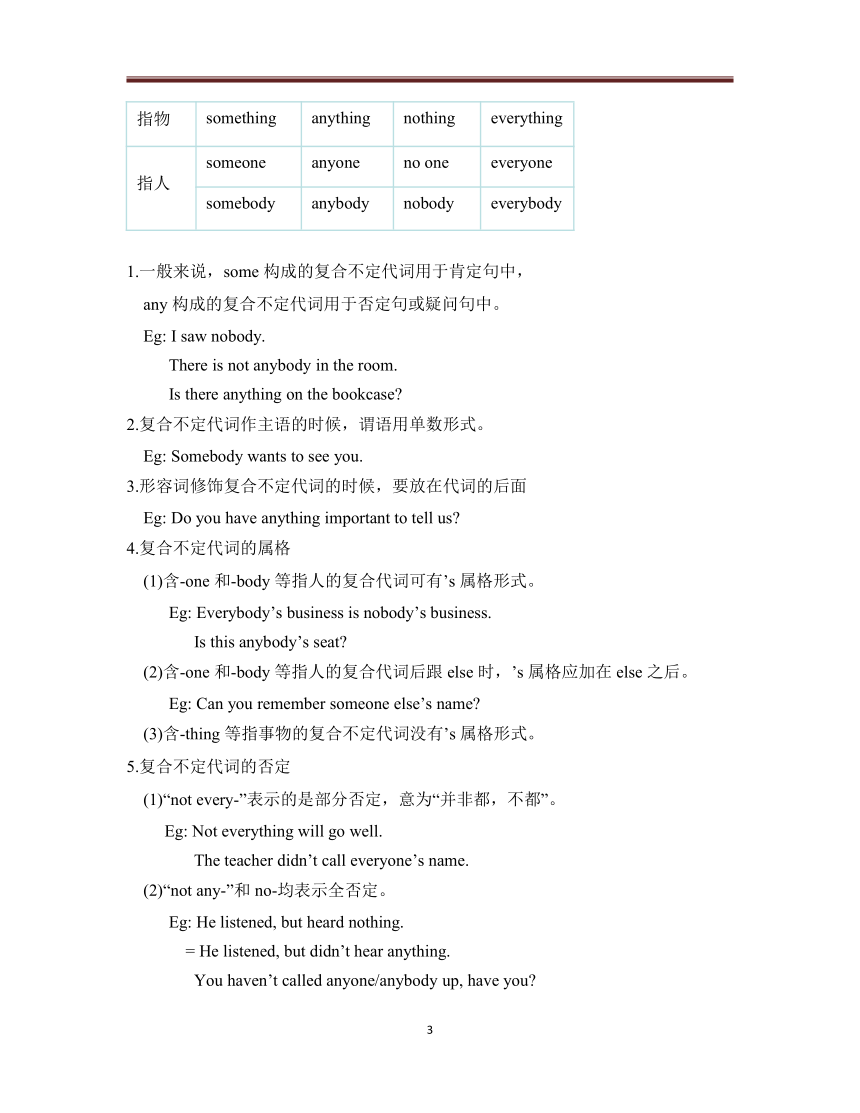
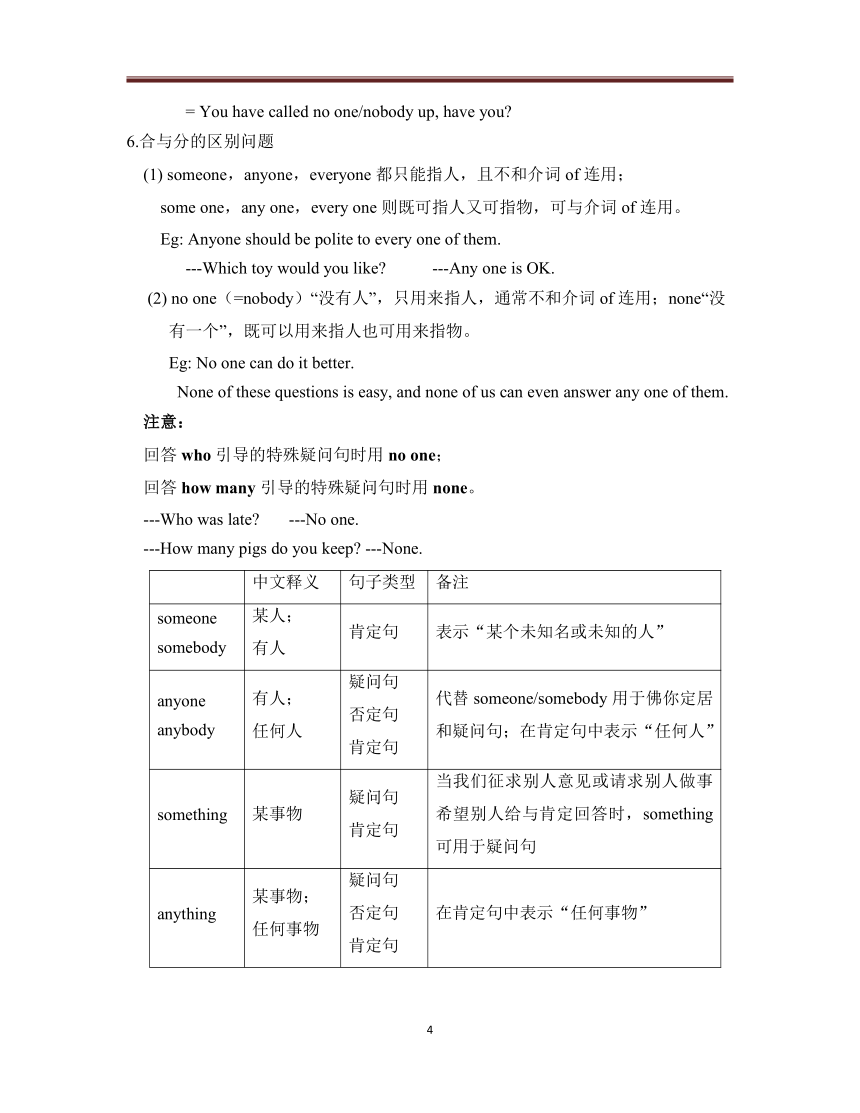
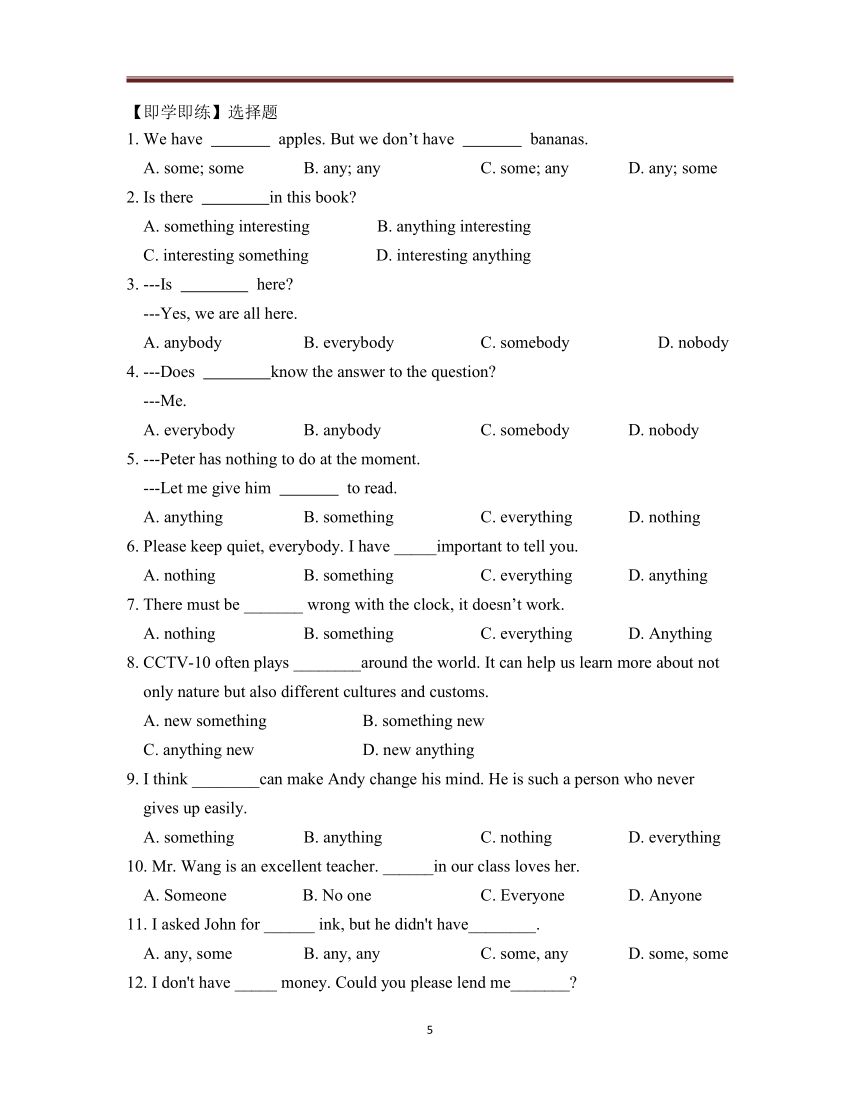
文档简介
第2讲
不定代词和情态动词
入门测
一.用some或any填空。
1.
Could
you
get
me
________
coffee,
please?
2.
I
heard
that
he
would
stay
there
for
________
days.
3.
Don’t
take
_______
magazines
out
of
the
reading
room.
4.
---Did
he
buy
_______
cakes
or
cookies?
---Cookies,
I
think.
5.
If
you
have
_______
questions,
ask
me,
please.
6.
Do
you
want
to
take
_______
photos?
7.
Is
there
_______
rice
in
the
kitchen?
8.
There
are
________
new
buildings
in
our
school.
9.
Here
are
________
presents
for
you.
10.
---Are
there
_______
pictures
on
the
wall??
---No,
there
aren’t
_______
pictures.
【答案】1.some
2.some
3.any
4.any
5.any
6.any
7.any
8.some
9.some
10.any,any
情景导入
Can
anybody
count
the
numbers
from
1
to
100?
学习目标
1.To
review
some
words
and
phrases
in
this
module.
2.To
review
how
to
use
these
words
and
phrases.
3.Attract
students’
interest
to
English
learning.
知识精讲
一、some与any的用法区别
any一般用于疑问句、否定句或条件句中,用于never,
hardly,
without等词之后,用于if
/
whether之后。
而some则用于肯定句中,用于建议或请求的疑问句中,用于预料会作肯定回答的疑问句中,用于表示反问的否定的疑问句中。
Eg:
He
has
some
books.
Some
dinosaurs
can
fly.
I
am
thirsty,
please
give
me
some
water.
Can
you
give
me
some
money?
(请求)
Would
you
like
some
more
rice?
(建议)
Why
don’t
you
buy
some
flowers
for
her?
(反问)
There
isn’t
any
water
in
this
bottle.
---Do
they
have
any
questions
about
dinosaurs?
---Yes,
they
have
some
questions
about
dinosaurs.
You
may
take
any
of
them.
If
you
have
any
question,
just
let
me
know.
二、复合不定代词
复合不定代词:一般是用some,
any,
no,
every与one,
thing,
body组合构成的。
指物
something
anything
nothing
everything
指人
someone
anyone
no
one
everyone
somebody
anybody
nobody
everybody
1.一般来说,some构成的复合不定代词用于肯定句中,
any构成的复合不定代词用于否定句或疑问句中。
Eg:
I
saw
nobody.
There
is
not
anybody
in
the
room.
Is
there
anything
on
the
bookcase?
2.复合不定代词作主语的时候,谓语用单数形式。
Eg:
Somebody
wants
to
see
you.
3.形容词修饰复合不定代词的时候,要放在代词的后面
Eg:
Do
you
have
anything
important
to
tell
us?
4.复合不定代词的属格?
(1)含-one和-body等指人的复合代词可有’s属格形式。
?
Eg:
Everybody’s?business?is?nobody’s?business.
Is?this?anybody’s?seat?
(2)含-one和-body等指人的复合代词后跟else时,’s属格应加在else之后。
Eg:
Can?you?remember?someone?else’s?name?
(3)含-thing等指事物的复合不定代词没有’s属格形式。
5.复合不定代词的否定?
(1)“not?every-”表示的是部分否定,意为“并非都,不都”。
?Eg:
Not?everything?will?go?well.??
The?teacher?didn’t?call?everyone’s?name.?
(2)“not?any-”和no-均表示全否定。
Eg:
He?listened,?but?heard?nothing.
=?He?listened,?but?didn’t?hear?anything.?
You?haven’t?called?anyone/anybody?up,?have?you??
=?You?have?called?no?one/nobody?up,?have?you??
6.合与分的区别问题?
(1)
someone,anyone,everyone都只能指人,且不和介词of连用;
some?one,any?one,every?one则既可指人又可指物,可与介词of连用。
?
Eg:
Anyone?should?be?polite?to?every?one?of?them.
---Which?toy?would?you?like??
---Any?one?is?OK.
?
(2)
no?one(=nobody)“没有人”,只用来指人,通常不和介词of连用;none“没有一个”,既可以用来指人也可用来指物。?
Eg:
No?one?can?do?it?better.??
None?of?these?questions?is?easy,?and?none?of?us?can?even?answer?any?one?of?them.
注意:
回答who引导的特殊疑问句时用no?one;
回答how?many引导的特殊疑问句时用none。
---Who?was?late??
---No?one.?
---How?many?pigs?do?you?keep??---None.?
中文释义
句子类型
备注
someonesomebody
某人;有人
肯定句
表示“某个未知名或未知的人”
anyoneanybody
有人;任何人
疑问句否定句肯定句
代替someone/somebody用于佛你定居和疑问句;在肯定句中表示“任何人”
something
某事物
疑问句肯定句
当我们征求别人意见或请求别人做事希望别人给与肯定回答时,something可用于疑问句
anything
某事物;任何事物
疑问句否定句肯定句
在肯定句中表示“任何事物”
【即学即练】选择题
1.
We
have
apples.
But
we
don’t
have
bananas.
A.
some;
some
B.
any;
any
C.
some;
any
D.
any;
some
2.
Is
there
in
this
book?
A.
something
interesting
B.
anything
interesting
C.
interesting
something
D.
interesting
anything
3.
---Is
here?
---Yes,
we
are
all
here.
A.
anybody
B.
everybody
C.
somebody
D.
nobody
4.
---Does
know
the
answer
to
the
question?
---Me.
A.
everybody
B.
anybody
C.
somebody
D.
nobody
5.
---Peter
has
nothing
to
do
at
the
moment.
---Let
me
give
him
to
read.
A.
anything
B.
something
C.
everything
D.
nothing
6.
Please
keep
quiet,
everybody.
I
have
_____important
to
tell
you.
A.
nothing
B.
something
C.
everything
D.
anything
7.
There
must
be
_______
wrong
with
the
clock,
it
doesn’t
work.
A.
nothing
B.
something
C.
everything
D.
Anything
8.
CCTV-10
often
plays
________around
the
world.
It
can
help
us
learn
more
about
not
only
nature
but
also
different
cultures
and
customs.
A.
new
something
B.
something
new
C.
anything
new
D.
new
anything
9.
I
think
________can
make
Andy
change
his
mind.
He
is
such
a
person
who
never
gives
up
easily.
A.
something
B.
anything
C.
nothing
D.
everything
10.
Mr.
Wang
is
an
excellent
teacher.
______in
our
class
loves
her.
A.
Someone
B.
No
one
C.
Everyone
D.
Anyone
11.
I
asked
John
for
______
ink,
but
he
didn't
have________.
A.
any,
some
B.
any,
any
C.
some,
any
D.
some,
some
12.
I
don't
have
_____
money.
Could
you
please
lend
me_______?
A.
any,
some
B.
some,
any
C.
any,
any
D.
some,
some
13.
Lincoln
came
from
nothing,
yet
he
did
______that
changed
the
world.
A.
something
B.
nothing
C.
everything
D.
anything
14.---How
is
Helen
in
the
new
school?
---She
is
doing
very
well.
There
is
____to
worry
about.
A.
something
B.
anything
C.
nothing
D.
everything
15.
There
is
_____in
today's
homework.
A.
difficult
nothing
B.
difficult
anything
C.
nothing
difficult
D.
anything
difficult
解析:1.C
2.B
3.A
4.B5.B.6.B.7.B.8.B.9.C.10.C.11.C.12.A.13.A.14.C.15.C
三、情态动词should
&
had
better
1.
should
的用法
(1)
should表示义务或责任?,意为“应该”
We?should?learn?from?each?other.?
should?表示建议或劝告?,意为“应该”
You?should?give?up?smoking.??
注意:有时语气较强,含有命令的意味:?You?should?leave?at?once.?
(3)?should?用于征求意见?,主要用于第一人称的疑问句形式?
Should?I?open?the?window??
(4)
should?表示谦逊或委婉?,通常与like,?love,?think,?say,?imagine等动词连用
I?should?like?to?know?why.?
I?should?imagine?it?will?take?about?three?hours.?
2.
had?better?的用法
(1)?had?better?表示“最好”,其缩写为“’d?better”,表示“有义务做某事”。
??
?He?warned?me?that?I?had?better?not?say?anything?about?it.
(2)
had?better?表示提出建议、劝告或命令等,含有“应该做某事”之意,一般适用于对晚辈、平辈。?
I?thought?you?had?better?have?my?opinion?first.。?
It’s?very?cold?outside.?You’d?better?put?on?more?clothes.
had?better?否定形式为had?better?not,,疑问句中had?better?的否定形式有两种
Hadn’t??+?主语?+better?+?动词原形?
Had?+?主语?+?better?not?+动词原形?
?Hadn’t?you?better?go?with?them??
Had?we?better?not?go??
had?better?do?sth.?有时可省略为?better?do?sth.?
Better?stay?at?home?and?have?a?good?rest.?
英语中,表示建议的方法:
表达方法
句型结构
含义
实例
直接建议法
Let’s
+
动词原形
一起做某事吧
Let’s
go
shopping.
委婉建议法
Shall
we+动词原形
我们做某事好吗?
Shall
we
go
out?
Would
you
mind(not)+动名词?
你介意(不)做某事吗?你不要做某事好吗?
Would
you
mind
not
smoking?
征求性建议
How
about/
What
about+名词、代词或动名词?
做某事怎么样?
How
about
playing
basketball?
责备性建议
Why
don’t
you/
Why
not
+动词原形?
你为什么不做某事呢?
Why
not
ask
your
teacher?
请求性建议
Would
you
like
to
do/
not
to
do?
你想做/
不想做某是吗?
Would
you
like
to
have
a
rest?
Would/Could
please
do/not
do
sth.?
请你做/
不要做某事好吗?
Would
you
please
wait
for
me?
【即学即练】
一、选择题。
You
_______
late
for
school.
A.
had
not
better
to
be
B.
had
not
better
be
C.
had
better
not
to
be
D.
had
better
not
be
You’d
better
________
at
once.
A.
go
B.
goes
C.
went
D.
to
go
I
wasn’t
sure
whether
I
_________
offer
to
help
or
not.
A.
should
B.
might
C.
would
D.
needed
We
_______
learn
as
much
as
we
can
at
school.
A.
may
not
B.
should
C.
shouldn’t
D.
mustn’t
According
to
the
new
law,
people
_______
drive
after
drinking
wine
or
beer.
A.
can
B.
wouldn’t
C.
needn’t
D.
mustn’t
It’s
raining
heavily
outside.
You
_______
leave
now.
A.
had
better
B.
ought
to
C.
had
better
not
to
D.
had
better
not
You’d
better
________
late
next
time.
A.
not
to
be
B.
not
be
C.
won’t
be
D.
don’t
be
You’re
making
so
much
noise
in
the
library!
You
_______
come
here.
A.
should
B.
shouldn’t
C.
will
D.
need
The
Earth
is
in
danger.
We
should
_______
more
trees.
A.
cut
down
B.
planting
C.
plant
D.
to
plant
Look!
What
you’ve
done!
You
______
more
careful.
A.
may
be
B.
had
to
C.
should
have
been
D.
would
be
Excuse
me,
I
want
to
go
to
YuexiuPark.
Which
bus
_______
I
take?
A.
must
B.
should
C.
may
D.
need
Johnny,
you
______
play
with
the
knife;
you
_______
hurt
yourself.
A.
shouldn’t,
may
B.
can’t,
shouldn’t
C.
won’t,
can’t
D.
mustn’t,
can
二、用所给词的适当形式填空。
1.
If
you
study
harder,
you
must
be
the
(win)
of
the
competition.
2.
She
walked
(confident)
across
the
hall.
3.
You’d
better
(look)
out
when
you
cross
the
street.
4.
We
shouldn’t
(arrive)
late
for
class.
It’s
impolite.
5.
They
had
fun
(swim)
in
the
river
last
week.
解析:一、1.D.2.A.3.A.4.B.5.D.6.D.7.B.8.B.9.C.10.B.11.B.12.A
二、1.winner
2.confidently.3.not
look
.4.arrive.5.swimming
当堂练习
一.英汉互译
1.
He
can’t
hear
you,
because
there
is
____
noise
here
A.
very
much
B.
too
much
C.
much
too
D.
so
many
2.
____
name
is
Han
Meimai.
A.
Herself
B.Hers
C.
She
D.
Her
3.
All
of
us
were
invited,
but
____
of
us
came
A.
neither
B.
none
C.
both
4.
The
weather
in
Shanghai
is
different
from
____
A.
Baotou
B.
Baotou
weather
C.
that
in
Baotou
D.
those
of
Baotou
5.
There
isn’t
____
water
in
the
cup.
A.
any
B.
many
C.
some
D.
the
6.
---Is
this
____
pen?
---No,
____
is
on
my
desk.
A.
your;
my
B.
yours;
my
C.
your;
mine
D.
yours;
mine
7.
The
bottle
is
empty.
There
is
____
in
it.
A.
anything
B.
something
C.
nothing
8.
---Look!
We
have
____
sugar.
---Really?
Let’s
go
and
buy
some.
A.
few
B.
a
few
C.
little
D.
a
little
9.
There
isn’t
____
milk
in
the
fridge.
You'd
better
buy
some.
A.
no
B.
any
C.
some
10.
---“There
isn’t
____
water
here.
Could
you
get
____
for
me?”
---“All
right.”
some;
some
B.
any;
any
C.
some;
any
D.
any;
some
解析:
1.B.too
much只能修饰不可数名词,
much
too
修饰形容词或副词,
very
much可修饰动词;many只能修饰可数名词,不能修饰不可数名词。
2.D.her作物主代词,意为“她的”,注意her还可作she的宾格。
3.B.句意:“我们都接到邀请,但我们谁没来。”none是all的反义词,表示“(三者以上的)没有一个(人或物)。”
4.C.that作为代词。代替主语
weather.
A项错误在于Baotou与前面的主语
weather不相对应,无法比较。代词that既可代替不可数名词,也可代替单数可数名词。
5.A.any用于疑问句和否定句,some用于肯定句。
6.C.your是形容词性物主代词,只能作定语修饰名词;
mine是名词性物主代词,可作主语、表语和宾语,但不能作定语。
7.C.空白处填nothing是与前一句的
empty相呼应、吻合的。
8.C.从后一句“去买些糖”可知“糖不多了”。little的意思是“少”,有否定含义,只能修饰不可数名词,
a
little是“一点”,有肯定含义。few和a
few是修饰或代替可数名词,前者否定,后者肯定。
9.B.肯定句中用some,疑问句和否定句中用any。
10.D.前一句是否定句,故用any
;后一句是说话者恳请别人做某事,希望对方同意,并认为对方能同意,故用some。
阅读理解。
A
Many
students
in
China
are
learning
english.
Some
of
these
students
are
small
children.
Others?are?teenagers.
Some?learn?at?school,
others?study?by
themselves.?A?few?learn?English?language?over?the?radio,?on?television,?or?in?films.?One
must?work
hard
to
learn
another
language.
Why
do
all
these
people
want
to
learn
English?
It
is
difficult
to
answer
that
question.
Many
boys
and
girls
learn
English
at
school
because
it
is
one
of
their
subjects.
They
study
their?own?language?and?maths?and?English?...Some?people?learn?English?because?it
is?useful?for?their?work.
Many?people?often?learn?English?for?their?higher?sutdies,?because
at?college?or?university
some?of?their?books?are?in?English.?Other?people?learn?English
because?they?want?to?read?newspaper?and?magazines?in?English.
(
)1.?Many?students?in?China?are?learning?English,?aren't?they??____.?
A.
?No,?they?aren’t??????
B.?No,?they?are?
C.?Yes,?they?are???????
D.?Yes,?they?aren’t?
(?
)2.?If?one?wants?to?learn?another?language?well,?he?must?____.?
A.?learn?at?school??????
B.?study?by?himself?
C.?work?hard????????
D.?study?hard?
(
?)3.?The?sentence
“It?is?difficult?to?answer?that?question”?means?____.?
A.
that?question?is?not?difficult?to?answer???
B.?that?question?is?difficult?to?answer?it?
C.?it?is?difficultly?to?answer?that?question???
D.?it?is?hard?to?answer?that?question?
(
?)4.?“Their?own?language”
means?____.?
A.
?Chinese???
B.?English???
C.?French???
D.?Japanese?
(
?)5.?What’s?the?Chinese?of?
“study?by?themselves”??
A.?和他们一起学习??????
B.?自学?
C.?向他们学习???????
D.?通过学习??
B
Once
upon
a
time,
there
lived
a
rich
man.
He
had
a
servant
(仆人).
he
and
he
servant
loved
wine?and?good?food?very?much.?Each?time?the?rich?man?left?his?home,?the?servant
would?drink?the?wine?and?eat?up?all?the?nice?food?in?the?house.?The
rich
man
knew
what
his
servant?did,?but?he?had?never?caught?his?servant?doing?that.?
One
morning,
when
he
left
home,
he
said
to
servant,
“Here
are
two
bottles
of
poison
(药)and?some?nice?food?in?the?house.
You?must?take?of?them.”
With?these?words,?he?went?out.??
But
the
servant
knew?that?the?rich?man?had?said?was?untrue.
After
the
rich
man
was
away
from?his?home,?he?enjoyed?a?nice?meal.?Because?he?drank?too?much,?he
was
drunk
and
fell
to?the?ground.?When?the?rich?man?came?back,?he?couldn’t?find?his?food?and
his
wine.
He?became?very?angry.?He?woke?the?servant?up.
But?the?servant?told?his?story?very
well.
He?said?a?cat?had?eaten?up?everything.?He?was?afraid?to?be?punished,?so?he?drank?the
poison
to
kill
him.
(??
)1.
In?the?story,?_______?liked?wine?and?good?food?very?much.??
??
A.?the?rich?man??
?
B.?the?servant???
C.?both?A?and?B???
D.?neither?A?and?B??
(??
)2.The?rich?man?knew?that?it?was?______?that?drank?the?wine?and?ate?up?all?the?nice?
food.
A.?the?cat??????
B.?himself?????
C.?nobody?????
D.?the?servant?
(??
)3.
The?rich?told?the?servant?that?there?was?poison?in?the?two?bottles,?because
_____.
A.
?there?was?in?fact?poison?in?the?bottles????
B.?did?not?want?the?servant?to?drink?his?wine????
C.?he?wanted?to?kill?the?cat????
D.?he?wanted?to?kill?the?servant??
(??
)4.
In?fact,?_______?ate?all?the?nice?food?and?drank?the?wine.????
A.
the?servant?????
B.?cat?????
C.?the?rich?man???
D.?nobody??
(??
?
)5.
From?the?story,?we?know?that?the?servant?is?very?_______.????
A.?lazy?????
?B.?bad?????
C.?clever?????
D.?kind?
解析:
A篇CCDAB?
B篇CDBAC???
当堂总结
今天的收获:___________________________________________________________________________________________________________________________________________________________________________________________________________________________________________________________________________________________________________________________________________________________________________________________________________________________________________
出门测
一、选择题
1.
Today,
____
trees
are
still
being
cut
down
somewhere
in
the
world.
A.
much
too
B.
too
much
C.
many
too
D.
too
many
2.
There
are
lots
of
English
books
here,
and
____
of
them
is
easy
to
understand.
A.
both
B.
all
C.
every
D.
each
3.
Is
the
shirt
on
the
bed
____
?
A.
yours
B.
your
C.
you
4.
Mr.
Green
taught
____
English
last
year.
A.
our
B.
we
C.
us
5.
These
sweaters
are
too
small
for
me.
Please
show
me
____
one.
A.
other
B.
others
C.
the
others
D.
another
6.
Mary
can’t
go
with
us.
____
has
to
look
after
____
mother
at
home.
A.
She;
his
B.
She;
her
C.
He;
her
D.
He;
His
7.
There
isn’t
____
paper
in
the
box.
Will
you
go
and
get
____
for
me?
A.any;
some
B.any;
any
C.
some;
some
D.
some;
any
8.
I
often
help
____
.
A.
he
or
she
B.
his
and
her
C.
him
and
her
D.
his
and
hers
9.
There
are
some
trees
on
____
side
of
the
street.
A.
both
B.
all
C.
either
D.
every
10.
“Which
of
the
two
dictionaries
do
you
like
better?”“I
like
____
,
because
they’re
not
useful.”
A.
both
B.
either
C.
all
D.
neither
解析:
一.
1.D.too
much只能修饰不可数名词,too
many只修饰可数名词;A项只修饰形容词或副词;C项本身就是错误的。
2.D.every和each都作“每一个”讲,但every只能作定语;each既可作定语,还可作主语、宾语、同位语等成分。both和all作主语(代替可数名词),谓语动词应用复数。
3.A
4.C.代词作宾语应用标本宾格,us是we的宾格。
5.D.other意为“别的、其它的”,可修饰单数名词,也可修饰复数名词。others表示“别人”或“别的事物”,是泛指的复数概念。the
other是特指的“其余的(人或物)”。another是泛指的“另一个(人或物)。”
6.B.She在句中作主语,故用主格,her作物主代词。
7.A.
8.C.代词作宾语应用宾格。
9.C.此处的either可换用each;
both后修饰复数名词。
10.D.后一个分句说“没有用”,当然是“两个都不喜欢。”
不定代词和情态动词
入门测
一.用some或any填空。
1.
Could
you
get
me
________
coffee,
please?
2.
I
heard
that
he
would
stay
there
for
________
days.
3.
Don’t
take
_______
magazines
out
of
the
reading
room.
4.
---Did
he
buy
_______
cakes
or
cookies?
---Cookies,
I
think.
5.
If
you
have
_______
questions,
ask
me,
please.
6.
Do
you
want
to
take
_______
photos?
7.
Is
there
_______
rice
in
the
kitchen?
8.
There
are
________
new
buildings
in
our
school.
9.
Here
are
________
presents
for
you.
10.
---Are
there
_______
pictures
on
the
wall??
---No,
there
aren’t
_______
pictures.
【答案】1.some
2.some
3.any
4.any
5.any
6.any
7.any
8.some
9.some
10.any,any
情景导入
Can
anybody
count
the
numbers
from
1
to
100?
学习目标
1.To
review
some
words
and
phrases
in
this
module.
2.To
review
how
to
use
these
words
and
phrases.
3.Attract
students’
interest
to
English
learning.
知识精讲
一、some与any的用法区别
any一般用于疑问句、否定句或条件句中,用于never,
hardly,
without等词之后,用于if
/
whether之后。
而some则用于肯定句中,用于建议或请求的疑问句中,用于预料会作肯定回答的疑问句中,用于表示反问的否定的疑问句中。
Eg:
He
has
some
books.
Some
dinosaurs
can
fly.
I
am
thirsty,
please
give
me
some
water.
Can
you
give
me
some
money?
(请求)
Would
you
like
some
more
rice?
(建议)
Why
don’t
you
buy
some
flowers
for
her?
(反问)
There
isn’t
any
water
in
this
bottle.
---Do
they
have
any
questions
about
dinosaurs?
---Yes,
they
have
some
questions
about
dinosaurs.
You
may
take
any
of
them.
If
you
have
any
question,
just
let
me
know.
二、复合不定代词
复合不定代词:一般是用some,
any,
no,
every与one,
thing,
body组合构成的。
指物
something
anything
nothing
everything
指人
someone
anyone
no
one
everyone
somebody
anybody
nobody
everybody
1.一般来说,some构成的复合不定代词用于肯定句中,
any构成的复合不定代词用于否定句或疑问句中。
Eg:
I
saw
nobody.
There
is
not
anybody
in
the
room.
Is
there
anything
on
the
bookcase?
2.复合不定代词作主语的时候,谓语用单数形式。
Eg:
Somebody
wants
to
see
you.
3.形容词修饰复合不定代词的时候,要放在代词的后面
Eg:
Do
you
have
anything
important
to
tell
us?
4.复合不定代词的属格?
(1)含-one和-body等指人的复合代词可有’s属格形式。
?
Eg:
Everybody’s?business?is?nobody’s?business.
Is?this?anybody’s?seat?
(2)含-one和-body等指人的复合代词后跟else时,’s属格应加在else之后。
Eg:
Can?you?remember?someone?else’s?name?
(3)含-thing等指事物的复合不定代词没有’s属格形式。
5.复合不定代词的否定?
(1)“not?every-”表示的是部分否定,意为“并非都,不都”。
?Eg:
Not?everything?will?go?well.??
The?teacher?didn’t?call?everyone’s?name.?
(2)“not?any-”和no-均表示全否定。
Eg:
He?listened,?but?heard?nothing.
=?He?listened,?but?didn’t?hear?anything.?
You?haven’t?called?anyone/anybody?up,?have?you??
=?You?have?called?no?one/nobody?up,?have?you??
6.合与分的区别问题?
(1)
someone,anyone,everyone都只能指人,且不和介词of连用;
some?one,any?one,every?one则既可指人又可指物,可与介词of连用。
?
Eg:
Anyone?should?be?polite?to?every?one?of?them.
---Which?toy?would?you?like??
---Any?one?is?OK.
?
(2)
no?one(=nobody)“没有人”,只用来指人,通常不和介词of连用;none“没有一个”,既可以用来指人也可用来指物。?
Eg:
No?one?can?do?it?better.??
None?of?these?questions?is?easy,?and?none?of?us?can?even?answer?any?one?of?them.
注意:
回答who引导的特殊疑问句时用no?one;
回答how?many引导的特殊疑问句时用none。
---Who?was?late??
---No?one.?
---How?many?pigs?do?you?keep??---None.?
中文释义
句子类型
备注
someonesomebody
某人;有人
肯定句
表示“某个未知名或未知的人”
anyoneanybody
有人;任何人
疑问句否定句肯定句
代替someone/somebody用于佛你定居和疑问句;在肯定句中表示“任何人”
something
某事物
疑问句肯定句
当我们征求别人意见或请求别人做事希望别人给与肯定回答时,something可用于疑问句
anything
某事物;任何事物
疑问句否定句肯定句
在肯定句中表示“任何事物”
【即学即练】选择题
1.
We
have
apples.
But
we
don’t
have
bananas.
A.
some;
some
B.
any;
any
C.
some;
any
D.
any;
some
2.
Is
there
in
this
book?
A.
something
interesting
B.
anything
interesting
C.
interesting
something
D.
interesting
anything
3.
---Is
here?
---Yes,
we
are
all
here.
A.
anybody
B.
everybody
C.
somebody
D.
nobody
4.
---Does
know
the
answer
to
the
question?
---Me.
A.
everybody
B.
anybody
C.
somebody
D.
nobody
5.
---Peter
has
nothing
to
do
at
the
moment.
---Let
me
give
him
to
read.
A.
anything
B.
something
C.
everything
D.
nothing
6.
Please
keep
quiet,
everybody.
I
have
_____important
to
tell
you.
A.
nothing
B.
something
C.
everything
D.
anything
7.
There
must
be
_______
wrong
with
the
clock,
it
doesn’t
work.
A.
nothing
B.
something
C.
everything
D.
Anything
8.
CCTV-10
often
plays
________around
the
world.
It
can
help
us
learn
more
about
not
only
nature
but
also
different
cultures
and
customs.
A.
new
something
B.
something
new
C.
anything
new
D.
new
anything
9.
I
think
________can
make
Andy
change
his
mind.
He
is
such
a
person
who
never
gives
up
easily.
A.
something
B.
anything
C.
nothing
D.
everything
10.
Mr.
Wang
is
an
excellent
teacher.
______in
our
class
loves
her.
A.
Someone
B.
No
one
C.
Everyone
D.
Anyone
11.
I
asked
John
for
______
ink,
but
he
didn't
have________.
A.
any,
some
B.
any,
any
C.
some,
any
D.
some,
some
12.
I
don't
have
_____
money.
Could
you
please
lend
me_______?
A.
any,
some
B.
some,
any
C.
any,
any
D.
some,
some
13.
Lincoln
came
from
nothing,
yet
he
did
______that
changed
the
world.
A.
something
B.
nothing
C.
everything
D.
anything
14.---How
is
Helen
in
the
new
school?
---She
is
doing
very
well.
There
is
____to
worry
about.
A.
something
B.
anything
C.
nothing
D.
everything
15.
There
is
_____in
today's
homework.
A.
difficult
nothing
B.
difficult
anything
C.
nothing
difficult
D.
anything
difficult
解析:1.C
2.B
3.A
4.B5.B.6.B.7.B.8.B.9.C.10.C.11.C.12.A.13.A.14.C.15.C
三、情态动词should
&
had
better
1.
should
的用法
(1)
should表示义务或责任?,意为“应该”
We?should?learn?from?each?other.?
should?表示建议或劝告?,意为“应该”
You?should?give?up?smoking.??
注意:有时语气较强,含有命令的意味:?You?should?leave?at?once.?
(3)?should?用于征求意见?,主要用于第一人称的疑问句形式?
Should?I?open?the?window??
(4)
should?表示谦逊或委婉?,通常与like,?love,?think,?say,?imagine等动词连用
I?should?like?to?know?why.?
I?should?imagine?it?will?take?about?three?hours.?
2.
had?better?的用法
(1)?had?better?表示“最好”,其缩写为“’d?better”,表示“有义务做某事”。
??
?He?warned?me?that?I?had?better?not?say?anything?about?it.
(2)
had?better?表示提出建议、劝告或命令等,含有“应该做某事”之意,一般适用于对晚辈、平辈。?
I?thought?you?had?better?have?my?opinion?first.。?
It’s?very?cold?outside.?You’d?better?put?on?more?clothes.
had?better?否定形式为had?better?not,,疑问句中had?better?的否定形式有两种
Hadn’t??+?主语?+better?+?动词原形?
Had?+?主语?+?better?not?+动词原形?
?Hadn’t?you?better?go?with?them??
Had?we?better?not?go??
had?better?do?sth.?有时可省略为?better?do?sth.?
Better?stay?at?home?and?have?a?good?rest.?
英语中,表示建议的方法:
表达方法
句型结构
含义
实例
直接建议法
Let’s
+
动词原形
一起做某事吧
Let’s
go
shopping.
委婉建议法
Shall
we+动词原形
我们做某事好吗?
Shall
we
go
out?
Would
you
mind(not)+动名词?
你介意(不)做某事吗?你不要做某事好吗?
Would
you
mind
not
smoking?
征求性建议
How
about/
What
about+名词、代词或动名词?
做某事怎么样?
How
about
playing
basketball?
责备性建议
Why
don’t
you/
Why
not
+动词原形?
你为什么不做某事呢?
Why
not
ask
your
teacher?
请求性建议
Would
you
like
to
do/
not
to
do?
你想做/
不想做某是吗?
Would
you
like
to
have
a
rest?
Would/Could
please
do/not
do
sth.?
请你做/
不要做某事好吗?
Would
you
please
wait
for
me?
【即学即练】
一、选择题。
You
_______
late
for
school.
A.
had
not
better
to
be
B.
had
not
better
be
C.
had
better
not
to
be
D.
had
better
not
be
You’d
better
________
at
once.
A.
go
B.
goes
C.
went
D.
to
go
I
wasn’t
sure
whether
I
_________
offer
to
help
or
not.
A.
should
B.
might
C.
would
D.
needed
We
_______
learn
as
much
as
we
can
at
school.
A.
may
not
B.
should
C.
shouldn’t
D.
mustn’t
According
to
the
new
law,
people
_______
drive
after
drinking
wine
or
beer.
A.
can
B.
wouldn’t
C.
needn’t
D.
mustn’t
It’s
raining
heavily
outside.
You
_______
leave
now.
A.
had
better
B.
ought
to
C.
had
better
not
to
D.
had
better
not
You’d
better
________
late
next
time.
A.
not
to
be
B.
not
be
C.
won’t
be
D.
don’t
be
You’re
making
so
much
noise
in
the
library!
You
_______
come
here.
A.
should
B.
shouldn’t
C.
will
D.
need
The
Earth
is
in
danger.
We
should
_______
more
trees.
A.
cut
down
B.
planting
C.
plant
D.
to
plant
Look!
What
you’ve
done!
You
______
more
careful.
A.
may
be
B.
had
to
C.
should
have
been
D.
would
be
Excuse
me,
I
want
to
go
to
YuexiuPark.
Which
bus
_______
I
take?
A.
must
B.
should
C.
may
D.
need
Johnny,
you
______
play
with
the
knife;
you
_______
hurt
yourself.
A.
shouldn’t,
may
B.
can’t,
shouldn’t
C.
won’t,
can’t
D.
mustn’t,
can
二、用所给词的适当形式填空。
1.
If
you
study
harder,
you
must
be
the
(win)
of
the
competition.
2.
She
walked
(confident)
across
the
hall.
3.
You’d
better
(look)
out
when
you
cross
the
street.
4.
We
shouldn’t
(arrive)
late
for
class.
It’s
impolite.
5.
They
had
fun
(swim)
in
the
river
last
week.
解析:一、1.D.2.A.3.A.4.B.5.D.6.D.7.B.8.B.9.C.10.B.11.B.12.A
二、1.winner
2.confidently.3.not
look
.4.arrive.5.swimming
当堂练习
一.英汉互译
1.
He
can’t
hear
you,
because
there
is
____
noise
here
A.
very
much
B.
too
much
C.
much
too
D.
so
many
2.
____
name
is
Han
Meimai.
A.
Herself
B.Hers
C.
She
D.
Her
3.
All
of
us
were
invited,
but
____
of
us
came
A.
neither
B.
none
C.
both
4.
The
weather
in
Shanghai
is
different
from
____
A.
Baotou
B.
Baotou
weather
C.
that
in
Baotou
D.
those
of
Baotou
5.
There
isn’t
____
water
in
the
cup.
A.
any
B.
many
C.
some
D.
the
6.
---Is
this
____
pen?
---No,
____
is
on
my
desk.
A.
your;
my
B.
yours;
my
C.
your;
mine
D.
yours;
mine
7.
The
bottle
is
empty.
There
is
____
in
it.
A.
anything
B.
something
C.
nothing
8.
---Look!
We
have
____
sugar.
---Really?
Let’s
go
and
buy
some.
A.
few
B.
a
few
C.
little
D.
a
little
9.
There
isn’t
____
milk
in
the
fridge.
You'd
better
buy
some.
A.
no
B.
any
C.
some
10.
---“There
isn’t
____
water
here.
Could
you
get
____
for
me?”
---“All
right.”
some;
some
B.
any;
any
C.
some;
any
D.
any;
some
解析:
1.B.too
much只能修饰不可数名词,
much
too
修饰形容词或副词,
very
much可修饰动词;many只能修饰可数名词,不能修饰不可数名词。
2.D.her作物主代词,意为“她的”,注意her还可作she的宾格。
3.B.句意:“我们都接到邀请,但我们谁没来。”none是all的反义词,表示“(三者以上的)没有一个(人或物)。”
4.C.that作为代词。代替主语
weather.
A项错误在于Baotou与前面的主语
weather不相对应,无法比较。代词that既可代替不可数名词,也可代替单数可数名词。
5.A.any用于疑问句和否定句,some用于肯定句。
6.C.your是形容词性物主代词,只能作定语修饰名词;
mine是名词性物主代词,可作主语、表语和宾语,但不能作定语。
7.C.空白处填nothing是与前一句的
empty相呼应、吻合的。
8.C.从后一句“去买些糖”可知“糖不多了”。little的意思是“少”,有否定含义,只能修饰不可数名词,
a
little是“一点”,有肯定含义。few和a
few是修饰或代替可数名词,前者否定,后者肯定。
9.B.肯定句中用some,疑问句和否定句中用any。
10.D.前一句是否定句,故用any
;后一句是说话者恳请别人做某事,希望对方同意,并认为对方能同意,故用some。
阅读理解。
A
Many
students
in
China
are
learning
english.
Some
of
these
students
are
small
children.
Others?are?teenagers.
Some?learn?at?school,
others?study?by
themselves.?A?few?learn?English?language?over?the?radio,?on?television,?or?in?films.?One
must?work
hard
to
learn
another
language.
Why
do
all
these
people
want
to
learn
English?
It
is
difficult
to
answer
that
question.
Many
boys
and
girls
learn
English
at
school
because
it
is
one
of
their
subjects.
They
study
their?own?language?and?maths?and?English?...Some?people?learn?English?because?it
is?useful?for?their?work.
Many?people?often?learn?English?for?their?higher?sutdies,?because
at?college?or?university
some?of?their?books?are?in?English.?Other?people?learn?English
because?they?want?to?read?newspaper?and?magazines?in?English.
(
)1.?Many?students?in?China?are?learning?English,?aren't?they??____.?
A.
?No,?they?aren’t??????
B.?No,?they?are?
C.?Yes,?they?are???????
D.?Yes,?they?aren’t?
(?
)2.?If?one?wants?to?learn?another?language?well,?he?must?____.?
A.?learn?at?school??????
B.?study?by?himself?
C.?work?hard????????
D.?study?hard?
(
?)3.?The?sentence
“It?is?difficult?to?answer?that?question”?means?____.?
A.
that?question?is?not?difficult?to?answer???
B.?that?question?is?difficult?to?answer?it?
C.?it?is?difficultly?to?answer?that?question???
D.?it?is?hard?to?answer?that?question?
(
?)4.?“Their?own?language”
means?____.?
A.
?Chinese???
B.?English???
C.?French???
D.?Japanese?
(
?)5.?What’s?the?Chinese?of?
“study?by?themselves”??
A.?和他们一起学习??????
B.?自学?
C.?向他们学习???????
D.?通过学习??
B
Once
upon
a
time,
there
lived
a
rich
man.
He
had
a
servant
(仆人).
he
and
he
servant
loved
wine?and?good?food?very?much.?Each?time?the?rich?man?left?his?home,?the?servant
would?drink?the?wine?and?eat?up?all?the?nice?food?in?the?house.?The
rich
man
knew
what
his
servant?did,?but?he?had?never?caught?his?servant?doing?that.?
One
morning,
when
he
left
home,
he
said
to
servant,
“Here
are
two
bottles
of
poison
(药)and?some?nice?food?in?the?house.
You?must?take?of?them.”
With?these?words,?he?went?out.??
But
the
servant
knew?that?the?rich?man?had?said?was?untrue.
After
the
rich
man
was
away
from?his?home,?he?enjoyed?a?nice?meal.?Because?he?drank?too?much,?he
was
drunk
and
fell
to?the?ground.?When?the?rich?man?came?back,?he?couldn’t?find?his?food?and
his
wine.
He?became?very?angry.?He?woke?the?servant?up.
But?the?servant?told?his?story?very
well.
He?said?a?cat?had?eaten?up?everything.?He?was?afraid?to?be?punished,?so?he?drank?the
poison
to
kill
him.
(??
)1.
In?the?story,?_______?liked?wine?and?good?food?very?much.??
??
A.?the?rich?man??
?
B.?the?servant???
C.?both?A?and?B???
D.?neither?A?and?B??
(??
)2.The?rich?man?knew?that?it?was?______?that?drank?the?wine?and?ate?up?all?the?nice?
food.
A.?the?cat??????
B.?himself?????
C.?nobody?????
D.?the?servant?
(??
)3.
The?rich?told?the?servant?that?there?was?poison?in?the?two?bottles,?because
_____.
A.
?there?was?in?fact?poison?in?the?bottles????
B.?did?not?want?the?servant?to?drink?his?wine????
C.?he?wanted?to?kill?the?cat????
D.?he?wanted?to?kill?the?servant??
(??
)4.
In?fact,?_______?ate?all?the?nice?food?and?drank?the?wine.????
A.
the?servant?????
B.?cat?????
C.?the?rich?man???
D.?nobody??
(??
?
)5.
From?the?story,?we?know?that?the?servant?is?very?_______.????
A.?lazy?????
?B.?bad?????
C.?clever?????
D.?kind?
解析:
A篇CCDAB?
B篇CDBAC???
当堂总结
今天的收获:___________________________________________________________________________________________________________________________________________________________________________________________________________________________________________________________________________________________________________________________________________________________________________________________________________________________________________
出门测
一、选择题
1.
Today,
____
trees
are
still
being
cut
down
somewhere
in
the
world.
A.
much
too
B.
too
much
C.
many
too
D.
too
many
2.
There
are
lots
of
English
books
here,
and
____
of
them
is
easy
to
understand.
A.
both
B.
all
C.
every
D.
each
3.
Is
the
shirt
on
the
bed
____
?
A.
yours
B.
your
C.
you
4.
Mr.
Green
taught
____
English
last
year.
A.
our
B.
we
C.
us
5.
These
sweaters
are
too
small
for
me.
Please
show
me
____
one.
A.
other
B.
others
C.
the
others
D.
another
6.
Mary
can’t
go
with
us.
____
has
to
look
after
____
mother
at
home.
A.
She;
his
B.
She;
her
C.
He;
her
D.
He;
His
7.
There
isn’t
____
paper
in
the
box.
Will
you
go
and
get
____
for
me?
A.any;
some
B.any;
any
C.
some;
some
D.
some;
any
8.
I
often
help
____
.
A.
he
or
she
B.
his
and
her
C.
him
and
her
D.
his
and
hers
9.
There
are
some
trees
on
____
side
of
the
street.
A.
both
B.
all
C.
either
D.
every
10.
“Which
of
the
two
dictionaries
do
you
like
better?”“I
like
____
,
because
they’re
not
useful.”
A.
both
B.
either
C.
all
D.
neither
解析:
一.
1.D.too
much只能修饰不可数名词,too
many只修饰可数名词;A项只修饰形容词或副词;C项本身就是错误的。
2.D.every和each都作“每一个”讲,但every只能作定语;each既可作定语,还可作主语、宾语、同位语等成分。both和all作主语(代替可数名词),谓语动词应用复数。
3.A
4.C.代词作宾语应用标本宾格,us是we的宾格。
5.D.other意为“别的、其它的”,可修饰单数名词,也可修饰复数名词。others表示“别人”或“别的事物”,是泛指的复数概念。the
other是特指的“其余的(人或物)”。another是泛指的“另一个(人或物)。”
6.B.She在句中作主语,故用主格,her作物主代词。
7.A.
8.C.代词作宾语应用宾格。
9.C.此处的either可换用each;
both后修饰复数名词。
10.D.后一个分句说“没有用”,当然是“两个都不喜欢。”
同课章节目录
